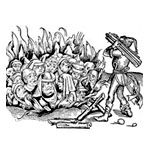
Is There a Biblical Basis for Capital Punishment?
UNDOING CALVARY
Does the Bible support the death penalty? Dale Recinella answers this question in his groundbreaking book The Biblical Truth About America’s Death Penalty (Northeastern University Press, 2004). Recinella, a former finance lawyer who has served for over twenty years as a chaplain on Florida’s death row, begins by pointing out that the death penalty in America is “a religious phenomenon encompassing matters of belief, faith, and morals.” For instance, the Bible was quoted in arguments in the state legislature when capital punishment was restored in New York in 1995. Since most executions take place in the Bible Belt, this is where prosecutors most often make use of three Bible verses when demanding the death sentence: “Who so sheds a man’s blood, by man shall his blood be shed” (Gen. 9:6); “He that smites a man, so that he die, shall surely be put to death” (Exod. 21:12); and “The murderer shall be put to death” (Num. 35:16). Prosecutors and death-penalty advocates alike cite these passages — which are all from the Old Testament — as proof that the Bible supports the death penalty. As Recinella demonstrates, however, this idea is far from the truth.
Most Christians do not understand how the death penalty was carried out in biblical times. Its standards were derived from both the written law (the Torah) and the oral law (believed to have been given to Moses on Mount Sinai, and recorded in the Talmud). In Genesis, Lamech embraced retaliatory vengeance and demanded that seventy-seven men die if he were killed (4:24). Mosaic Law, rather than endorsing such violence, limited the penalty to one life for one life.
What’s more, the Bible recommends the death penalty for over thirty crimes besides murder, including idolatry, apostasy, blasphemy, witchcraft, sacrifice of children, work on the Sabbath, perjury in capital cases, kidnapping, hitting or being disloyal to a parent, adultery, incest, sodomy, and bestiality. Recinella observes that “based on the scriptural lists of death-eligible offenses…the entire community should be lining up for lethal injection.” On what scriptural basis, he asks, do we pick out murder from this list, or decide to take the words “life for life” literally but not “fracture for fracture, eye for eye, tooth for tooth, hand for hand, and foot for foot”?
It’s not so simple, then, to find a scriptural basis for the death penalty as it is practiced in the U.S., especially since there is no warrant for it in the Gospels. As for the rest of the New Testament, defenders of capital punishment cite Romans 13:4, a passage that supports the power of judicial authority to punish wrongdoers. The problem is, this passage contains no mandate for capital punishment. Romans 13:4 has been misused in other areas in the past century as well — for example, to stifle opposition to Nazism and to defend Apartheid.
You May Also Enjoy
Would any reasonable person think it appropriate to execute a duly tried and convicted pregnant woman before the birth of the baby?
She who shared the highs in our Lord's life shared as well in His rejection. There is a striking similarity between the indignities suffered by Mother and Son.
At death will our thoughts be aimed at how to defeat it or how to make the experience an extension of the redemptive work of the Cross?

